|
|
|
 |
|
|
|
Et in Arcadia ego. That Latin crumpet should set the Tea Party on edge. Drive them fat proto Sturmabteilung muthas into a Lock & Load frenzy. Barber Perfect says that Nicolas Poussin knew exactly what he was doing when he bent the Latin to fit his obsession. Some of the Etics swear he meant the phrase and the 2 paintings wherein he used the phrase as a Momento Mori. So it translates as Death himself claiming that Yes, even He - Mister Death - exists in Arcadia, the poetic land of Utopia & Paradise. Others beg to differ. Skippy's Main-Man Erwin Panofsky got off on the possible ambiguities of the bad latin. The phrase seems to be begging for a verb - Sister Samuel would insist that the correct string should read: "Et in Arcadia ego sum." Tea Baggers & Conservatives want even more. They want the gloss to read: "I also was an Arcadian." And that the claim was from a person in a Tomb who smiles in his eternity as he remembers the pleasures of his life on Earth. The translation of Poussin's iffy Latin has bewitched the Menschen-kenners for nearly 400 years. Poussin lived at the time of Spinoza & Descartes. Leibniz & Bruno. All those fuckers had their own private languages. |
|
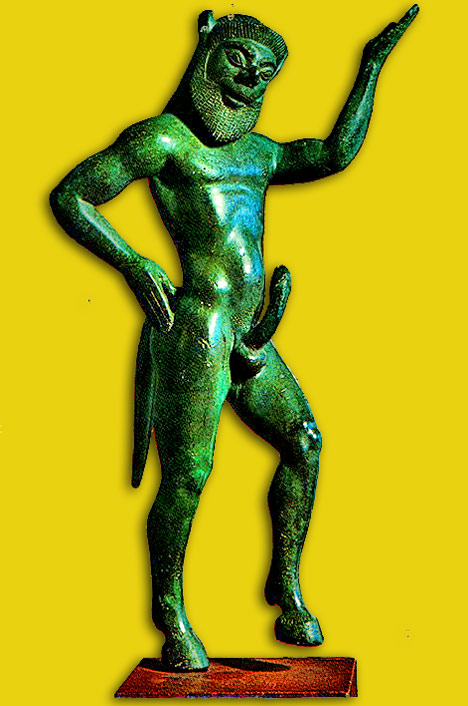 |
Pan has part of the same problem. He too is a literary puzzle. The Emics will claim that the god Pan takes his name from the Greek term for "ALL" - as in "Everything." In fact, most authors who have ever dealt with the Arcadian Deity have constructed an entire Mythology around that gloss of his name. Pan is Nature, they say, because, Like Spinoza, Nature is Everything and Everything is All. Thus the Pan in Pantheism. Good story. Nice fit. It almost hurts to disagree. But Pan takes his name from the Greek "paein" which means: To pasture. Not that the difference really matters. Pan is Rusticia. He is the essence of the Rustic. He's the god of shepherds & flocks. He's the god of Hunting and Hillbilly Music. Cirlot sums the goat up like this: "The god Pan is a symbol of nature, and is usually represented with horns (expressive of the sun's rays and of the aggressive force of Aries) and with legs covered with hair (denoting the vitality of base forces, earth, shrubs and the instincts." He is also an aspect of Saturn in myth and astrology, "and is also equated with Satan and with life in its involutive, and, in particular, its base aspects." In Particular, indeed. About 50% of the time, Pan is depicted as he is to the left, Ithyphallic, grinning, & goin' to the party.
|
|
|
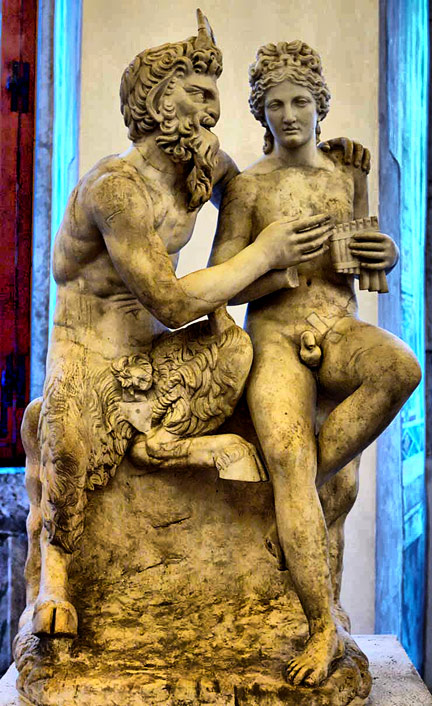 |
|
Pan is an Aggregate God - he's a composite. His hindquarters, legs, and horns are pure Goat. The rest of him is Human, including his dick. Pan is found in fields, groves, wooded glens, and up and down the mountain pastures & streams. All of this makes Pan the spirit of Fertility and Spring. He's also PanSexual as you can see from this statue of Pan and his Eromenos, the shepherd Daphnis. Roll over the picture and see the Statue of Pan and Eros underneath. Pan's like most dudes; he'll fuck pretty much anything. The Romans call him Faunus and say that he's the father of Bona Dea - the ancient earth mother goddess whom they also called: Fauna. Skippy loves the Archetypal Complex which all these Names signify. You can see a Lord of the Hunt and the Lord of the Animals brewing in the linguistic schema. Fauna for sure. Besides the question of his name there is also an argument about his parents. Some myths have him as the Son of Zeus. Most say that Pan is the son of Hermes & sometimes Dionysos because Pan's mother is said to be a Nymph in the "service" of the god Dionysos who guttered himself in Nymphs. His mother could have been Dryope; her myth claims she was seduced by Hermes & thus gave birth to Pan. But the poet Robert Graves has pointed out that as a mythofigure Pan is much older than Hermes & was ancient at the time that the Egyptian god Thoth was taken into Greece as Hermes. Other Etics place their bets on Pan's mother being the Nymph Penelope of Mantineia in Arcadia. This Nymphette goes on to become hopelessly conflated and entwined with Penelope the long-suffering & horny wife of Odysseus. Here's where it gets interesting & revelative: Some of the conflated myths say that Penelope was, in fact, unfaithful to the hero Odysseus/Ulysses as he tripped all over the Aegean on his 10 year Odyssey. But, wait for it ... she fucked her Suitors. All of them. All 108 of them. The Birth of Pan was the result of this Mythic Gangbang. So Pan is more Mixed than even his Goat/man body indicates. Here's where the Etics grin & point to the reason for the linguistic conflation concerning his name. Pan, they say, shifts its primary meaning of Pasture to "All" because of the miracle of Pan being born from 108 fierce fathers humpin' the nymph until the flocks came home. Pan is a Composite of Animal & Instinctual Nature. Like all Greek Nature Spirits, Pan is older than the gods from Olympus. It was Pan who gave Artemis/Diana her hunting dogs. It was Pan who taught Apollo the Secret of Prophecy. Pan is more than likely, like Satan, the Oldest of the Old. His roots stretch back into the Upper Paleolithic. Like his father Hermes, Pan is one of the Monkey's first attempts to give a concrete form to the idea that Nature is All One thing but that thing has a dualistic, complementary, oppositional temperament & needed to be understood and drained of its secrets, then tamed. Packaged. Improved & branded. |
|
|
Ovid tells the story of how Pan got his Pipes. On the mountain-sides of Arcadia lived the lovely Nymphae Syrinx. She was famed for her beauty and her chastity. She worshipped Artemis/Diana & girt herself in the fashion of that goddess. Except her bow was made from Horn and not Gold. All the Satyri wanted Syrinx and her life was a constant chase. Pan was determined to have the bitch, no matter what. So he chased her thru the fields, over the pastures, thru the wilderness and finally he had the Nymphette cornered at Ladon's peaceful and sandy bottomed stream. She couldn't swim so it looked her prize was his. Suddenly Syrinx screamed out a plea to the "Sorores Liquidae" - the Watery Sisters - those spirits of stream, lake, and river. "Change Me!" She pleaded. And just as Pan was grabbing at her tits, the spirits transformed Syrinx into an armful of tall marsh reeds. Pan sobbed and sighed and his woeful breath stirred in the reeds which gave off their thin and plaintive sound. The music of his own shattered dreams bewitched him. So he lashed together 7 reeds of different lengths and you can hear him playing on his pipes the mournful music of his lusts even today. |
|
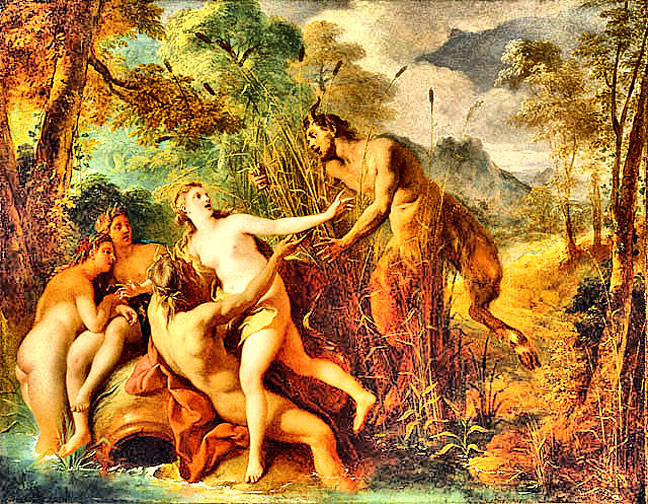 |
|
|
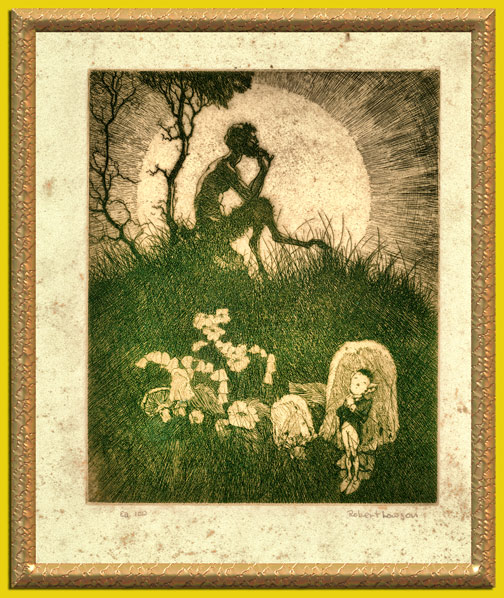 |
|
|
Pan is unlucky in love and most myths stress that he never married. Echo was an Oread - a mountain nymph - whose singing was said to be mesmerizing. Zeus wanted her badly but could never catch up to Echo. Sometimes, to give herself some peace from his eternal chasing, Echo would entertain Hera, Zeus's wife, with her enchanting voice, while Zeus could chase the other nymphs and fuck himself into a collapsed & drowsing heap. Hera discovered this trick and snatched Echo's beautiful Voice leaving her only the ability of repeating, endlessly, the last words and sounds which she heard. But when the myth is handed to Pan and rebranded it comes out like this: Pan is lusting after Echo and chases her ad infinitum. Echo, like Syrinx & most good Nymphs, has vowed to remain a Virgin in the Garden of God. Pan is so pissed when she refuses him her Cherry that he causes a "Panic" which causes a group of drunken & crazed shepherds to kill her and tear her body to pieces and spread those pieces all over the earth. Gaia - or Bona Dea, the names really don't matter - takes into her body all these displaced pieces of Echo but allows her Voice to remain on Earth where it can only repeat the words and sounds of the Others. Some versions of the Pan/Echo myth have the two as married and giving birth to two kinder: Iambe and Lynx. Pan seduces and beds the Moon by spinning a garment from the Golden Fleece of his flocks and then using that coat to hide himself and his "base nature" from the beautiful Selene or Luna. Panselene is a Greek term which means "Full Moon." Pan rewards Selene for her gift of Virginity by giving her a Silver Chariot pulled by a brace of Oxen, or Horses, or sometimes by a pair of Serpentine Dragons. You can hear Claude Lévi Strauss breathing wistfully thru the Pipes of Pan. Myths are reactions to Binary Oppositions in the Mentalité of the Monkey; their function is to repair the Contradictions. How could you picture Nature - or God - in the face of her polarities? Think of yourself as a Child as you do it. |
|
|
|
|
|
|
|
|
|
|
|
|
|
|
|
|
|
 |
Arcadia is a mountainous district of Greece and in Classical times it was known for a Rustic, unsophisticated, Hillbilly kind of resident. Mountain Folk. It's a sparse & an undergraded environment. Hunting is tough so Pan was just as likely to have been cursed as worshipped. Roll over the classic Pan to the left and see the earliest rendition of the force we call Pan from the Paleolithic era about 20,000 years ago. Half-man, Half-beast, Ithyphallic, and dancing. Francis Bacon, the Philosopher-Scientist - who also lived at the time of Spinoza & Descartes, Poussin & Leibniz - wrote extensively on the god Pan in his book: On the Wisdom of the Ancients. Bacon is considered to be the Father of Empiricism & the Scientific Method. Like Newton, he dabbled in Alchemical Philosophy, and, like Spinoza, he too thought the Universe was a Monad. One single thing fallen into diversity. Perhaps more than anyone, Bacon was responsible for the continuation & propagation of the Etymological mistake concerning Pan's name. For Francis Bacon, Pan was Nature and Nature was God. The 17th Century was the Alpha & the Omega, the Beginning and the End of things. Christianity had Zenithed & from the embers of Bruno's pyre you could smell the long rot of faith in its infancy. Metaphorically shitting its pants. Reason was coming. Measurement was shifting from Qualia to Quanta. Logic, men thought, would birth the New Dispensation. Bacon writes: "Pan, as the very word declares, represents the universal frame of things, or Nature. About his origin there are and can be but two opinions; for Nature is either the offspring of Mercury [Hermes/Thoth] - that is of the Divine Word; or else of the things mixed and confused together. For they who derive all things from a single principle, either take that principle to be God, or if they hold it to be material principle, assert it to be thru actually one yet potentially many; so that all difference of opinion on this point is reducible to one or other of these two heads, - the world is spring either from Mercury, or from all the Suitors." In Bacon's philosophical rendition Penelope's 108 Suitors who impregnate her have become "material principles" which as Parts compose the Whole. Alchemy's Nigredo - the Massa Confusa striving towards endless mergings to, as it were, "fuck itself out of diversity" into One. Or Back into the One. |
|
|
|
That's Poussin again. It's called "The Triumph of Pan" and the painting seems to be focused on "Pandaemonium" where Pan wears his diabolic aspect and is coupled with Satan. This picture was commissioned by Cardinal de Richelieu and dispatched from Rome to Paris in May 1636. With its companion, "The Triumph of Bacchus", it was designed to form part of the decoration of the Cabinet du Roi in the Château de Richelieu. Bacon comments on Pan's Horns as symbols of the World: "That the world is represented with horns, and that such horns are broad at bottom and narrow at top, has relation to the fact that the whole frame of nature rises to a point like a pyramid. For individuals are infinite: these are collected into species, which are themselves also very numerous; the species are gathered up into genera, and these again into genera of a higher stage; till nature, contracting as it rises, seems to meet at last in one point. Nor need we wonder that Pan’s horns touch heaven; since the summits, or universal forms, of nature do in a manner reach up to God; the passage from metaphysic to natural theology being ready and short." And on Pan's woolly body: "The body of Nature is most elegantly and truly represented as covered with hair; in allusion to the rays which all objects emit; for rays are like the hairs or bristles of nature; and there is scarcely anything which is not more or less radiant. This is very plainly seen in the power of vision, and not less so in all kinds of magnetic virtue, and in every effect which takes place at a distance. For whatever produces an effect at a distance may be truly said to emit rays. " |
|
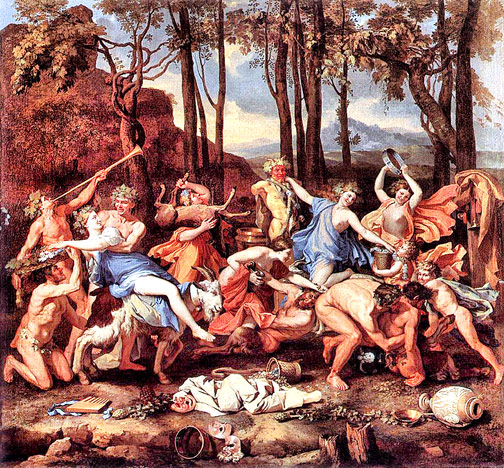 |
|
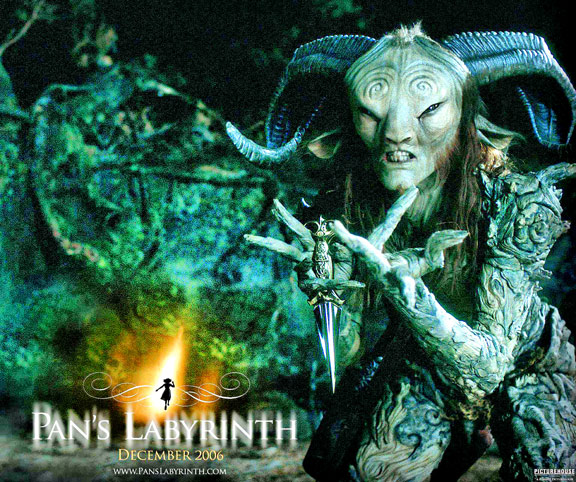 |
Bacon should have written for Hollywood: "Again, the body of Nature is most truly described as biform; on account of the difference between the bodies of the upper and the lower world. For the upper or heavenly bodies, are for their beauty and the equability and constancy of their motion, as well as for the influence they have upon earth and all that belongs to it, fitly represented under the human figure: but the others, by reason of their perturbations and irregular motions, and because they are under the influence of the celestial bodies, may be content with the figure of a brute. The same description of Nature’s body may be referred also to the mixture of one species with another. For there is no nature which can be regarded as simple; every one seeming to participate and be compounded of two. Man has something of the brute; the brute has something of the vegetable; the vegetable something of the inanimate body; and so all things are in truth biformed and made up of a higher species and a lower. There is also a very ingenious allegory involved in that attribute of the goat’s feet; which has reference to the motion upwards of terrestrial bodies towards the regions of air and sky: for the goat is a climbing animal, and loves to hang from rocks and cling to the sides of precipices: a tendency which is also exhibited in a wonderful manner by substances that belong properly to the lower world—witness clouds and meteors." |
|
|
|
One of Pan's most infamous adventures concerns his contest with Apollo over whose music most moved the gods. Pan went first and blew a melody of country longing & bucolic sentiment. The gods were crying in their beer. Apollo followed on his Lyre & the gods were transformed, transfixed, and transported. Timolus, the Mountain God, gave the victory to Apollo. In another recension of this myth the contest ended in a tie so Apollo suggested that they play another round but this time that they play their instruments upside down. Pan is Hillbilly god of Nature & not too bright so he agreed. This time Apollo went first and had no trouble inverting his Lyre and plucking out a bright melody of deep emotion. Pan turned his pipes around and suddenly realized that they would not play upside down. Apollo grinned & winked at the ruined god Pan and his dumb pipes. |
|
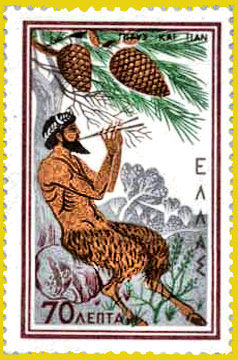 |
Francis Bacon comments on this contest: "Then again that match in music and the result of it exhibits a wholesome doctrine, fit to restrain and reduce to sobriety the pride and overweening confidence of human reason and judgment. For it seems there are two kinds of harmony and music; one of divine providence, the other of human reason; and to the human judgment, and the ears as it were of mortals, the government of the world and nature, and the more secret judgments of God, sound somewhat harsh and untunable; and though this be ignorance, such as deserves to be distinguished with the ears of an ass, yet those ears are worn secretly and not in the face of the world—for it is not a thing observed or noted as a deformity by the vulgar." King Midas, one of Pan's groupies, had the balls to claim that Pan had won the contest so Apollo turned his ears into those of a Donkey. Pan, by the way, is the god of Artistic Criticism.
|
|
| Pan is muy famoso for his Sexual prowess & is never shy at exhibiting his stiff cock. Diogenes, in a drunken saga, conflates the Egyptian myths of Thoth & Atum when he relates that it was Hermes, Pan's proud Papa, who taught Pan how to Jack Off. Pan was rocked back! Jerking Off was so much fun that he immediately taught the skill to the Shepherds. Even today, traveling in the Peloponnesia, you can still see Shepherds tending sheep & goats on the rocky scabbard & gently beating off on the stones. Seed to Seed, so to speak. But Pan is even more famous for something closely related to his Regenerative Organ: his Death. Pan, Plutarch says is the only Greek god who ever died. The Roman Historian made this claim in his work: De defectu oraculorum, or: "The Obsolescence of Oracles." So you can see the Roman might have had an agenda. Thamus, a sailor, was going to Italy by Island hopping. One day, at sea, a "divine voice" called to him from across the waters: "Thamus, are you there? Tell everybody - Pan is Dead. The Great God Pan is Dead!" Lamentations followed wherever Thamus stopped to spread the news. Robert Graves says the whole fucking story is another mistranslation and that it was Tammuz who had died and not Pan. Nearly everything we think we know about Pan is the result of a linguistic error. That should make you think. |
|
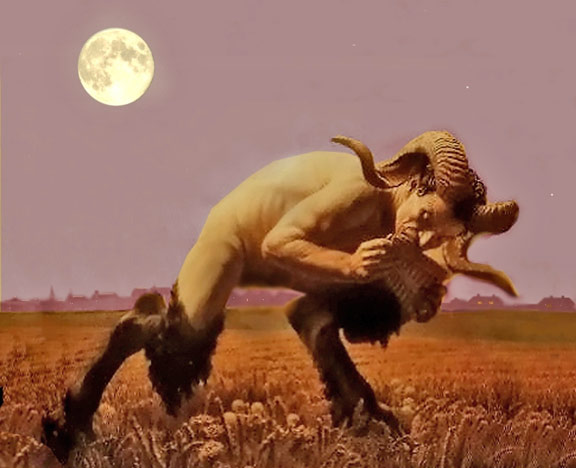 |
|
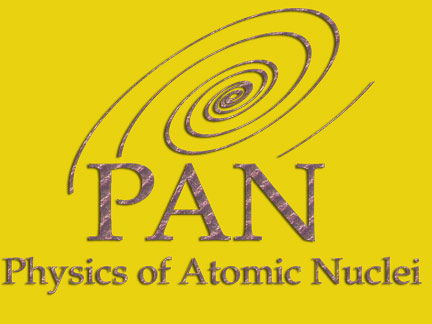 |
Christians pounced on Plutarch's story and puffed it up for centuries until it has become part of Kiki Dogma. They claimed that the tale fulfilled all 4 Forms of Medieval Exegesis: 1. History - it was literally true. Pan was dead. 2. Allegory - the old order was dead and the Christian Dispensation had begun. 3. Tropology - here meaning is Figurative - Nature has yielded to Culture, The Raw has become Cooked. The Moral? Transubstantiation Saves the World. 4. Anagogy - this is Meaning derived thru Religious/Ecstatic Elevation or Mystical Feeling - on this level of Exegesis the Death of Pan illustrates the "Triumph of the Logos over Eros." Christians hated Pan but they loved the "facts" of his death. John Milton celebrated Pan's passing in his poem: "On the Morning of Christ's Nativity." This cemented the "fact" that Pan got a bad cough when Jesus was born and that he finally croaked at the exact moment that Longinus plunged his Lance into the side of the Crucified Christ. Christians milked that story as if they had become "kids" again and had "Fallen into Milk." The Irony connected with Milton's celebration of the victory of Christ over Pan was that the poem itself was written to the exact form of Pagan Nativity Poems and in the end only served to increase the nostalgia for a return to nature and to set the stage for the English Romantics who would once again crown Pan supreme. |
|
|
|
|
|
|
|
|
|
|
|
|
|
|
|
|
|
|
|
|
|










